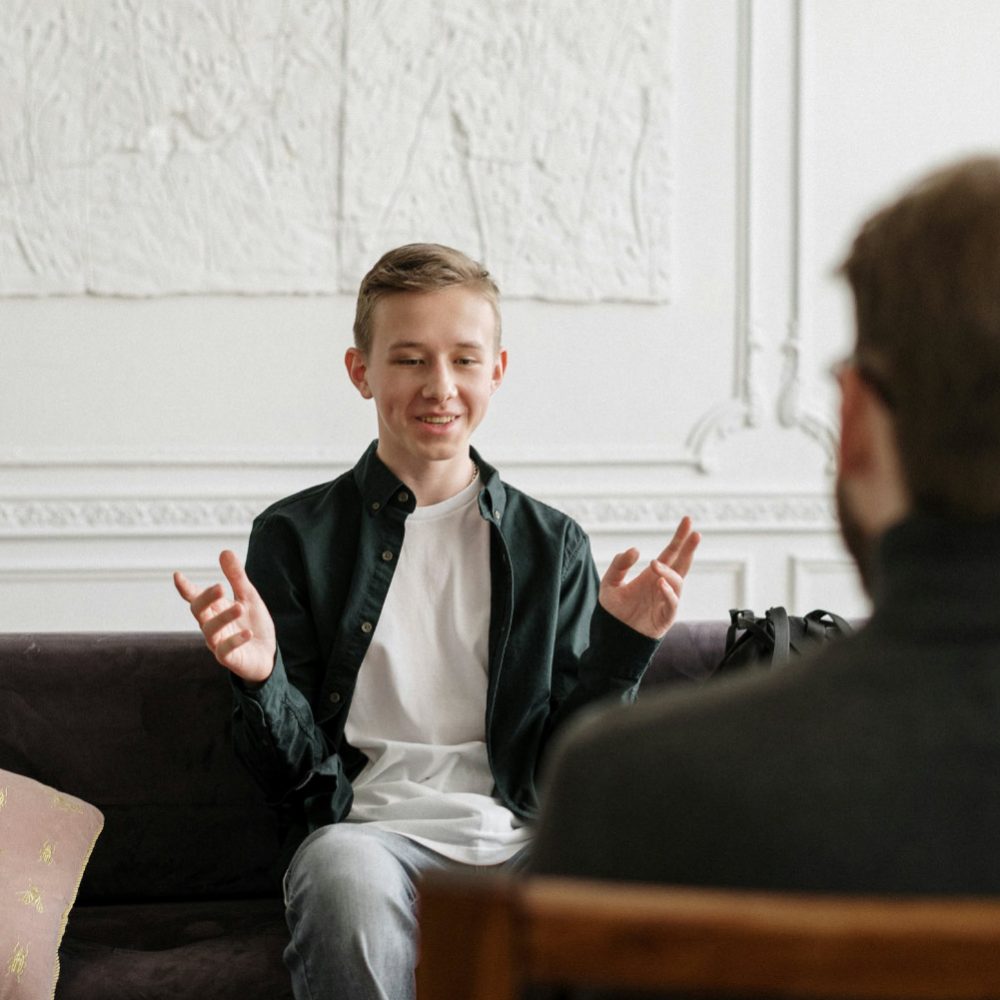New Jersey
Teen Therapy
With increasing pressures from social media, academic demands, and personal struggles in today’s environment, more teens are turning to therapy for support. Teen therapy is a specialized form of mental health counseling designed to help adolescents navigate the emotional, psychological, and behavioral challenges they face. Teen therapy at Behaved Brain provides a safe and supportive environment where teens can express their thoughts, explore their emotions, and develop coping skills to handle stress, anxiety, and depression, as well as other mental health concerns. The goal of teen therapy is to empower young adolescents to understand their emotions, improve their mental well-being, and develop healthy strategies for coping with life’s difficulties today – and well into the future.
More About
Teen Therapy

According to the National Institute of Mental Health (NIMH) 50% of all lifetime mental illnesses begin by age 14. At Behaved Brain, teen therapy is used to support adolescents experiencing emotional distress, mental health disorders, or difficulties in their personal, academic, and social lives. The teenage years are a critical period of development, and the challenges that arise during this time can significantly impact long-term mental health and well-being even for neurotypical teens. Therapy provides teens with the tools and guidance needed to overcome these challenges in a healthy and constructive manner.
Some common reasons for seeking teen therapy include:
- Emotional difficulties such as sadness, mood swings, and anxiety
- Struggles with self-esteem and self-worth
- Academic pressures and school-related stress
- Peer pressure and social challenges
- Family conflicts and communication issues
- Trauma, abuse, or significant life changes
- Substance use or risky behaviors


The Benefits Of
Teen Therapy

Teen therapy plays a crucial role in addressing mental health challenges and fostering emotional growth and resilience to build stronger relationships and learn effective ways to handle stress and adversity. Teen therapy services are especially helpful for parents who struggle to communicate effectively with their teen, even when thoughtful, concerted efforts are made. By engaging in therapy, teens learn how to regulate their emotions, build confidence, and create positive change in their lives. Professional teen therapy and teen counseling provides the following benefits:
- Offers a judgment-free space to express emotions and concerns
- Teaches effective coping strategies for anxiety, depression, and stress
- Encourages self-awareness and emotional intelligence
- Improves communication skills and relationships with family and peers
- Helps teens navigate identity, self-esteem, and self-acceptance
- Supports teens in developing problem-solving and decision-making skills
- Prevents long-term mental health struggles by addressing issues early
How To Tell If Your
Teen Needs Therapy
It’s important to recognize the signs that a teenager may benefit from therapy. In fact, only 40% of teens with mental health conditions receive proper treatment, according to the CDC. And while occasional mood swings and stress are normal during adolescence, persistent emotional distress or significant behavioral changes may indicate a deeper issue. If a teen exhibits any of these symptoms for an extended period, seeking professional help can provide valuable support and intervention.
- Persistent sadness, hopelessness, or crying spells
- Anxiety, excessive worry, or panic attacks
- Extreme mood swings or irritability
- Withdrawal from family, friends, and social activities
- Declining academic performance or lack of motivation
- Sleep disturbances, such as insomnia or oversleeping
- Changes in appetite and weight
- Engaging in self-harm or expressing thoughts of self-harm
- Aggressive or reckless behaviors
- Substance use or increased risky behavior
- Difficulty concentrating or making decisions
Types Of
Teen Therapy

At Behaved Brain, our therapists and counselors use various evidence-based approaches to help teens work through personal issues, family dynamics, academic pressures, and social challenges. The most effective treatment depends on the teen’s individual needs and concerns.

Cognitive Behavioral Therapy (CBT)
CBT is one of the most widely used therapies for teens. It focuses on identifying negative thought patterns and replacing them with healthier, more constructive ways of thinking. CBT helps teens manage anxiety, depression, and stress by teaching them how to regulate their thoughts and emotions. CBT has been found to be effective in treating anxiety and depression in 70% of adolescents, according to the American Psychological Association (APA).
Dialectical Behavior Therapy (DBT)
DBT is particularly effective for teens struggling with emotional dysregulation, self-harm, or borderline personality traits. This therapy teaches mindfulness, distress tolerance, emotional regulation, and interpersonal effectiveness skills.
Family Therapy
Family therapy involves parents and siblings in the therapeutic process. It helps improve communication, resolve conflicts, and create a more supportive home environment. Family therapy is often used when family dynamics contribute to a teen’s mental health struggles.
Group Therapy
Group therapy provides teens with the opportunity to connect with peers who are experiencing similar challenges. It fosters a sense of community and teaches social skills, emotional expression, and coping strategies in a supportive environment.
Art and Music Therapy
For teens who struggle with verbal expression, creative therapies like art and music therapy provide alternative ways to process emotions. These therapies can be particularly beneficial for teens dealing with trauma, anxiety, or depression.
Psychodynamic Therapy
This therapy helps teens explore past experiences, unconscious thoughts, and emotions that may be affecting their current behavior and relationships. It can be helpful for those dealing with deep-seated emotional struggles.

frequently asked questions about
Teen Therapy
How do I know if my teen needs therapy?
If your teen is experiencing persistent emotional distress, significant changes in behavior, withdrawal from social activities, academic struggles, or expressions of self-harm or hopelessness, it may be time to seek therapy. A professional mental health evaluation at Behaved Brain with our trained therapists and counselors can help determine the best course of action.
What is the best type of therapy for teenagers?
The best type of therapy for teenagers depends on the teen’s individual needs. Cognitive Behavioral Therapy (CBT) is commonly used for anxiety and depression, while Dialectical Behavior Therapy (DBT) is effective for emotional regulation. Family therapy can also be beneficial when family dynamics are a contributing factor.
How long does teen therapy take?
The duration of therapy varies depending on the teen’s needs and the severity of their challenges. Some teens may see progress in a few months, while others may benefit from long-term therapy. Regular assessments with a therapist can help determine the appropriate length of treatment.

Start Your Teen Therapy Journey

Teen therapy is a crucial resource for adolescents navigating the complexities of mental health challenges. By offering professional support, evidence-based treatment, and a safe space for expression, therapy empowers teens to build resilience, improve their well-being, and thrive in their personal and academic lives. If you suspect your teen may benefit from therapy, seeking professional guidance with the team at Behaved Brain can be a vital step toward positive change.







